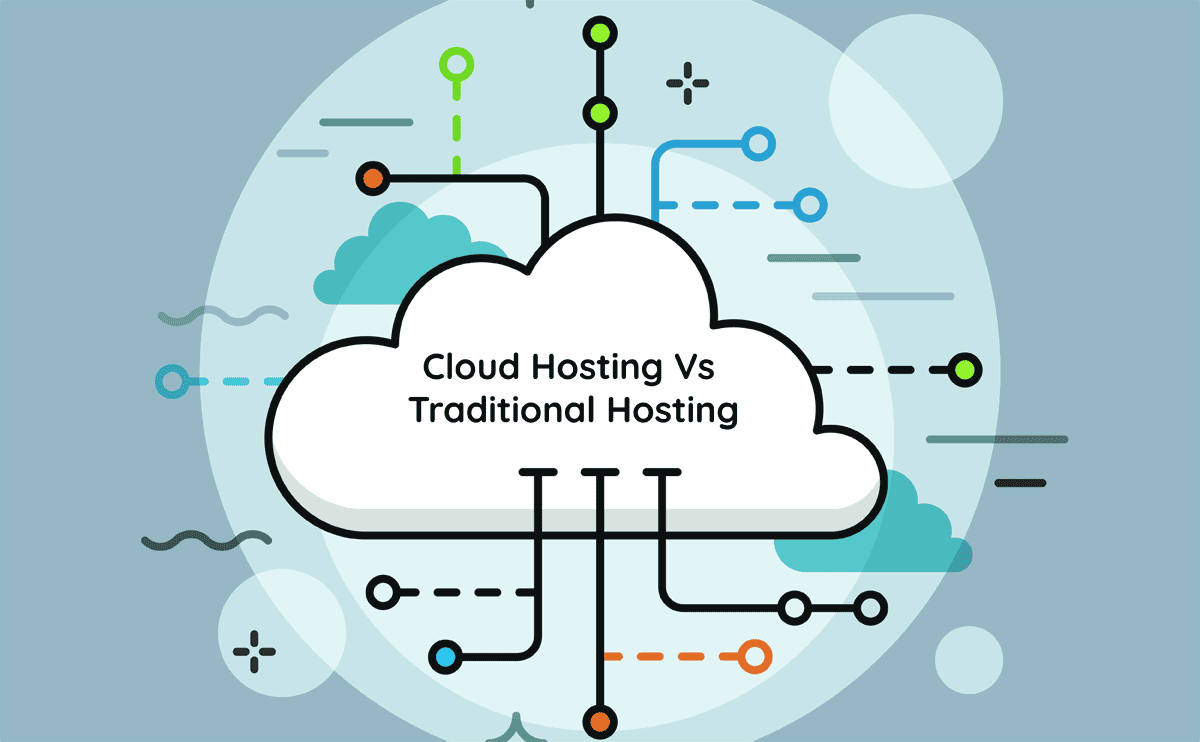When you purchase through links on our site, we may earn a commission. Here’s how it works.

Cloud hosting is all the rage these days, but is it as good as the hype? In our comparison of cloud hosting and traditional website hosting, we’ll discuss the features of each, what sets them apart, and how they compare to other hosting types. We’ll also look at the pros and cons and provide examples of hosting providers, as well as pricing.
What Is Cloud Hosting?
Cloud hosting is a type of web hosting that stores data on multiple servers in a network instead of a single server. That provides you with several advantages over a single server.
4 Advantages Of Cloud Hosting
- Scalability – your website is stored on multiple servers, which allows for greater scalability and flexibility. If a server is offline for any reason, your site will still be up and running, as the other servers in the network can pick up the slack. And it can be easily moved between servers. This means that the hosting resources can be increased or decreased as needed, making it ideal for websites that experience a lot of traffic spikes.
- Reliability – all of the scalability factors mentioned above result in much higher website reliability, as the website will still be up and running even if a server is offline. CloudFlare, for example, even has an “Always Online” feature that will pull an archived version of your website from the Internet Archive in the rare event that everything goes down.
- Upgradability – this also makes it easier to upgrade the hosting resources, as the website can be moved from one server to another more easily.
- Security – cloud hosting can be more secure than traditional hosting, as the data is spread out across multiple servers, making it much more difficult for hackers to access.
When it comes to the pros and cons of cloud hosting, there are certainly more pros than cons. On the plus side, cloud hosting is more reliable, secure, scalable, and flexible than traditional hosting. It is also more cost-effective, as the hosting resources can be increased or decreased as needed, making it ideal for websites with high traffic spikes.
Are There Any Disadvantages To Cloud Hosting?
One of the few downsides of cloud hosting is that it can be more expensive than traditional hosting, and there is the potential for outages if a server is offline.
Examples of Cloud Hosting Providers
Some of the more popular names in cloud hosting are Amazon Web Services, Google Cloud Platform, and Microsoft Azure. But there are hundreds of hosting providers today that offer some form of cloud hosting. Our best hosting providers comparison has many examples.
What Is Traditional Website Hosting?
Traditional website hosting is the most common type of website hosting and involves storing the website data on a single physical server. This type of hosting is very reliable, as the website data is stored in one place and is not prone to outages like cloud hosting can be. It is also more secure than cloud hosting, as the data is not spread across multiple servers. However, it is not as scalable as cloud hosting, as it is limited to the resources of the server. It is also not as flexible, as the website cannot be moved between servers.
Pros And Cons Of Traditional Hosting
Traditional hosting is a lot more limited when it comes to features. It is not as scalable as cloud hosting, as the resources are limited to the physical capabilities of the server. It is also not as flexible, as your website cannot be moved as easily between servers. Reliability and security will depend on the configuration of the server, so these elements are in the hands of your hosting provider.
Examples of Traditional Hosting Providers
Just about any hosting provider, save those that focus exclusively on cloud services, will provide traditional hosting. Our best hosting providers comparison has many examples.
Pricing Comparison
When it comes to pricing, cloud hosting is usually more expensive than traditional hosting. This is because cloud hosting offers more features and scalability, which require more resources and result in higher costs. However, cloud hosting can be more cost-effective in the long run, as the hosting resources can be increased or decreased as needed, making it ideal for websites with high traffic spikes. Traditional hosting is usually more affordable than cloud hosting, but it is limited to the resources of the server.
Comparisons To Other Hosting Types
Cloud hosting and traditional hosting are both very popular hosting options, but they are not the only options available. There are many other hosting types, including shared hosting, VPS hosting, and dedicated hosting. Shared hosting is the most affordable option, but it is not as reliable or secure as cloud or traditional hosting. VPS hosting is more reliable and secure than shared hosting, but it is still more limited than cloud hosting and can be more expensive. Dedicated hosting is the most reliable and secure option, but it is also the most expensive. Our experts compare them all in our comparison of shared, VPS, WordPress, cloud, and dedicated hosting.
VPS vs Reseller Hosting
VPS stands for Virtual Private Server, and it is a type of hosting that provides users with a virtual machine. This machine is independent, and each user gets their own allocated resources such as RAM, storage, and bandwidth. One of the main advantages of VPS hosting is that it is more reliable and secure than shared hosting. It also provides users with more control and flexibility, as users can install their own applications and configure the server as they wish. Our experts compare VPS vs reseller hosting.
Conclusion
When it comes to hosting a website, there are a number of options available, including cloud hosting and traditional website hosting. Cloud hosting is more reliable, secure, scalable, and flexible than traditional hosting, making it ideal for websites with high traffic spikes. However, it is more expensive than traditional hosting, and there is the potential for outages if a server is offline. Traditional hosting is more reliable and secure than cloud hosting, as the website data is stored in one place, but it is not as scalable or flexible. There are also many other hosting types available, including shared hosting, VPS hosting, and dedicated hosting. Ultimately, the best option will depend on the needs and budget of the website owner.
Top 3 Hosting Providers For Small Business
Bigger isn’t always better. Size is just one of the key factors that separate a good host from a bad one. A good website host can:
- Load your websites quickly and reliably from any point on the globe.
- Offer a fixed resource allocation that will prevent your website from going down due to someone else’s mistakes.
- Provide you with informed and easy-to-reach customer service that resolves issues immediately after the occurrence without the need for your prompting.
What about pricing? Pricing, as with any business purchase, plays a role. But with the proliferation of low-quality shared hosting companies battling for pricing advantages, the lower the price, the lower the quality of hosting tends to be. Our experts compare the top hosting providers for your business.
Tagged With: VS


